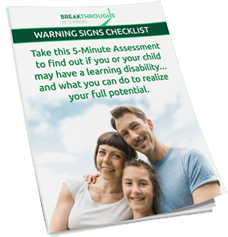
Does it affect life at home, at school or at work?
Take 5 minutes to complete the Warning Signs Checklist and discover whether you or your child could have learning difficulties that are impacting your life, and what to do about it.
Take The Free Warning Signs Checklist!
 Recently I kicked off a series of articles looking at six different types of memory and how they work. From elementary students to adults, many suffer from memory weaknesses without realizing it. Breakthroughs assesses six different types of memory and this article is the third in a series of blogs about each type, and how they affect our lives. First we looked at two types of visual memory, last week we introduced two types of auditory memory. I highly recommend you read last week’s blog introducing Auditory Memory as today is based on the information discussed there.
Recently I kicked off a series of articles looking at six different types of memory and how they work. From elementary students to adults, many suffer from memory weaknesses without realizing it. Breakthroughs assesses six different types of memory and this article is the third in a series of blogs about each type, and how they affect our lives. First we looked at two types of visual memory, last week we introduced two types of auditory memory. I highly recommend you read last week’s blog introducing Auditory Memory as today is based on the information discussed there.
For those of you that read the Visual Memory article this may sound familiar as the visual and auditory systems function in somewhat similar ways.
Below is a picture of how your memory functions. The red bucket represents where long term auditory memories are kept. It may contain a conversation you had, a joke you heard, a lesson from school or instructions from the boss. In this example, the client can store a high average amount of auditory information. This sounds reasonably good. However, we must also look at retrieval. The retrieval system works like a magnet. It reaches into the storage tank and pulls out the required information. In our example, (shown in blue) the score of 2 shows the magnet is quite weak. This places the client in the 11th percentile*. (see footnote*)

For the student who works hard to pay attention every class, this score means they would be unable to retrieve most of the lecture information at test time. For a child this often leads to trouble. Mom or Dad gave them specific instructions to follow and the child will be unable to follow through as requested, leaving everyone frustrated. This Auditory Memory scenario causes problems in the work place as well, with missed due dates, errors on projects and even termination. All of these cases lead to internal frustration and the development of coping mechanisms to compensate for the memory deficit. Creating a coping mechanism is not a good strategy since it ignores the root cause of the problem.
As you can see these symptoms are not relegated to seniors. If you, your child or student struggle with any of the warning signs above chances are it’s not going to improve on its own. One recent study indicated that, in a cross-section of generally healthy people,
“Memory declined by an average of 25 percent between the ages of twenty-five to eighty.” Dharma Singh Khalsa, M.D., ” Brain Longevity”
Again the good news is, just like visual memory, it CAN be developed and improved! Many of our clients at Breakthroughs struggle with at least one, and often a few of the six different memory skills we assess. The results show what needs to be targeted, and a program is designed to meet your specific needs.
The best part? Seeing results! I love the opportunity to retest areas we are working on as a progress check. Clients (and parents!) light up when they see their hard work is paying off. This often comes with some feedback about how they have experienced the improvement for themselves. Here is an example from a local high school student.

“I was in grade twelve and finding the courses overwhelming. I needed help with my comprehension, organization and memories. I’ve graduated and I’m very thankful for the benefits Breakthroughs provided. My future possibilities are wide open now.”
Next week we will wrap up Auditory Memory by taking a look at a specific Auditory Memory disability many people have and don’t even know. People end up not forgetting the conversation like the scenario discussed today, but instead adding information to the conversation! Have you ever had your child or spouse tell you that you said something you’re sure you never said? Does your child ‘make things up’ and seem convinced they’re right? Tune in next week to find out why this happens, and better yet, what can be done about it!
Percentile is a term frequently used in scoring assessments. 11th percentile means that in a room with 100 people, this person would be 11th from the bottom.
Subscribe to our newsletter and receive regular articles and resources to help you or your child perform better at school, home or work.
suscribe now
Post Your Comment Below